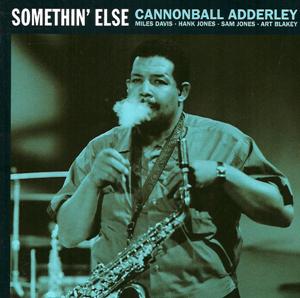1. Autumn Leaves
2. Love for Sale
3. Somethin' Else
4. One for Daddy-O
5. Dancing in the Dark
6. Allison's Uncle
7. Spectacular
8. Miss Jackie's Delight
9. Tribute to Brownie
10. Cobbweb
11. Jeannie
12. Another Kind of Soul
13. Spring is Here
14. Eddie McLin
Julian "Cannonball" Adderley - Alto sax
Miles Davis - Trumpet (tracks 1-6)
Hank Jones - Piano (tracks 1-6)
Sam Jones - Bass
Art Blakey - Drums (tracks 1-6)
Nat Adderley - Cornet (tracks 7-14)
Junior Mance - Piano (tracks 7-14)
Jimmy Cobb - Drums (tracks 7-14)
It baffles me why so many people regard trumpeter Miles Davis as
some kind of god, while they tend to ignore (or at least, underrate)
altoist Cannonball Adderley. The comparison between the two players
on this reissued album throws up the deficiencies in Miles's playing
while demonstrating the huge talent of Cannonball. The original LP
was recorded in 1958, when Adderley was a member of the Miles Davis
group which was to make the renowned Kind of Blue album the
following year. Miles Davis possibly appeared on the session to help
the young altoist, who was only just beginning to make his name (Miles
says he did the session "as a favour").
Of course, it may be inequitable to compare the two musicians, since
they were such different players. Cannonball was confidently extrovert
while Miles could seem tentative and even uncomfortable. Perhaps the
difference between the two might be summed up by saying that Adderley
was hot where Davis was cool - or, at least, that Cannonball was usually
warm where Miles could be chilly. But the main difference for me could
be described as one of confidence. When Cannonball plays, I feel secure
in the knowledge that he will never falter whereas, when listening
to Miles, I worry that he may split a note or even play the wrong
notes. Certainly he has many fine moments on this album, but often
resorts to repeating the same note or flying theatrically up into
the stratosphere when one senses that inspiration has deserted him.
Nonetheless, there is plenty of fine music on the first six tracks,
which comprise the original recording session with Miles, although
he is absent from Dancing in the Dark, which features Cannonball
in rhapsodic mood at ballad tempo. Autumn Leaves becomes a
masterpiece, with a mystic opening riff from the piano and long-held
notes by Adderley and Davis. Miles's solo is poignant, although slightly
marred by his habit of moving down a tone at the end of a sequence.
Cannonball's solo is radiant, leaping about joyfully, and Hank Jones
solos with his customary aplomb. Love for Sale is taken at
an easy bounce, with occasional hints of Latin-American rhythm.
Somethin' Else, the title-track, was composed by Miles Davis
and is a simple riff tune, although with a complex harmonic structure.
Hank Jones's piano solo uses block chords reminiscent of George Shearing.
Nat Adderley wrote One for Daddy-O in tribute to disc jockey
Daddy-O Daylie. It is an attractive loping blues which allows Cannonball
to wail soulfully. Davis's solo is in the minimal style he developed
with Gil Evans.
The sixth track - which is also entitled Bangoon - was not
on the original LP but was added to CD reissues. Art Blakey gets a
short drum solo on this one. On this new CD, the last eight tracks
are a generous bonus, taken from the 1957 album Sophisticated Swing
(omitting only a short track by the rhythm section). This keeps the
same bassist (Sam Jones) but changes the rest of the personnel, bringing
in Cannonball's brother, cornettist Nat Adderley, who generally sounds
more sure-footed than Miles did. However, Nat hasn't got the unique
tone which made Miles so distinctive.
The Adderley brothers played together for many years and developed
the sort of synergy which is invaluable in jazz. Their session starts
with a tearaway tune called Spectacular, which is just what
it says on the tin. Cannonball really lets rip on this track, although
the speed feels a bit excessive for Junior Mance. Miss Jackie's
Delight is one of three numbers written by bassist Gene Wright,
who also composed Cobbweb and Eddie McLin. Sam Jones's
double bass is rightly prominent on this track.
Nat Adderley's statement of the theme to Duke Pearson's Tribute
to Brownie pays justified homage to trumpeter Clifford Brown,
which is underlined by Cannonball's heartfelt solo. Cobbweb
features drummer Jimmy Cobb's faultless technique. Jeannie
is the sort of funky outing for which the Adderleys later became famous.
Nat Adderley proves he can play high notes without strain.
Nat's composition Another Kind of Soul is also funky, with
an easygoing solo from Cannonball. Spring is Here is freshened
with some unusual harmonies and soulful alto from Cannonball. Eddie
McLin closes the album with a walk along mean but blues-soaked
streets. Junior Mance is very much at home in these surroundings.
So this CD is a game of two halves. Miles Davis-worshippers will
love the first six tracks but personally I like them all but slightly
prefer the last eight, which use a more relaxed and integrated quintet.
Take your pick.
Tony Augarde
